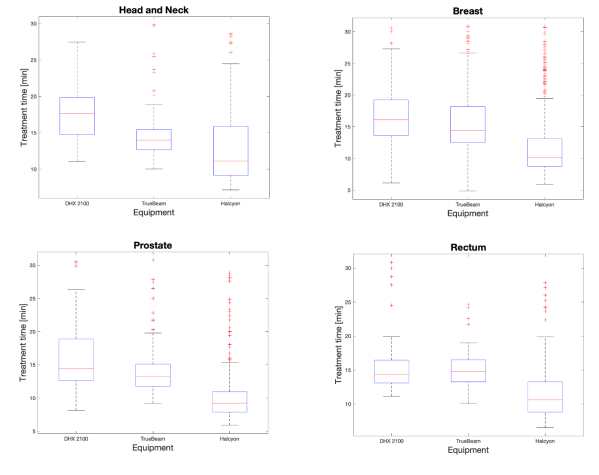Faster treatment using Halcyon linear accelerator: the experience of Parma University Hospital
PO-1664
Abstract
Faster treatment using Halcyon linear accelerator: the experience of Parma University Hospital
Authors: Michele Maddalo1, Aldo Mazzilli1, Giovanna Benecchi1, Nunziata D'Abbiero2, Caterina Ghetti1
1Azienda Ospedaliero Universitaria di Parma, Medical Physics Department, Parma, Italy; 2Azienda Ospedaliero Universitaria di Parma, Radiotherapy Department, Parma, Italy
Show Affiliations
Hide Affiliations
Purpose or Objective
The Varian Halcyon accelerator could
potentially speed up radiotherapy sessions without a significant loss of the
overall treatment quality respect to conventional linear accelerators. Patient
positioning and treatment setup benefit from the availability of external
light-markers and of a simplified and guided workflow. The time dedicated to
IGRT can be reduced due by fast CBCT acquisition. In addition, higher maximum
speeds of both gantry and MLC could allow to reduce the VMAT beam-on time. This
study aims to compare VMAT treatment time between Halcyon and other linear
accelerators and to quantify the time saving.
Material and Methods
The overall treatment time on the three linear
accelerators available at our hospital – Halcyon (H), TrueBeam (TB), 2100 DHX
(DHX) - were retrospectively, systematically and anonymously acquired during
the first three months of Halcyon activity using InSightive Analytics (IA)
software for the following treatment sites: head and neck (H&N), breast,
prostate and rectum. IA records the delay between opening and closing of each
radiotherapy session at the treatment console. Treatment times were
statistically compared between each pair of accelerators using Mann-Whitney non
parametric test. The percentage of time saved using Halcyon rather than one of
the other machines was also evaluated (comparing median values).
Results
Using IA software, treatment times of up to 356,
1212, 577 and 190 patients were retrospectively and systematically recorded for
H&N, breast, prostate and rectum sites respectively during a period of three
months. For all anatomical sites, a statistically significant time reduction
(p<<0.001) was obtained for H compared to both TB and DHX linear
accelerators. The percentages of saved time using H were 28% (TB) and 59% (DHX)
for H&N, 41% (TB) 57% (DHX) for breast, 44% (TB) 60% (DHX) for prostate,
46% (TB) 41% (DHX) for rectum.

Conclusion
Halcyon is able to drastically reduce the
overall VMAT treatment time for all investigated anatomical sites. Despite of
the relatively short observation period, InSightive Analytics software allowed
for a systematic, large-population analysis which was characterized by an high
level of statistical significance.